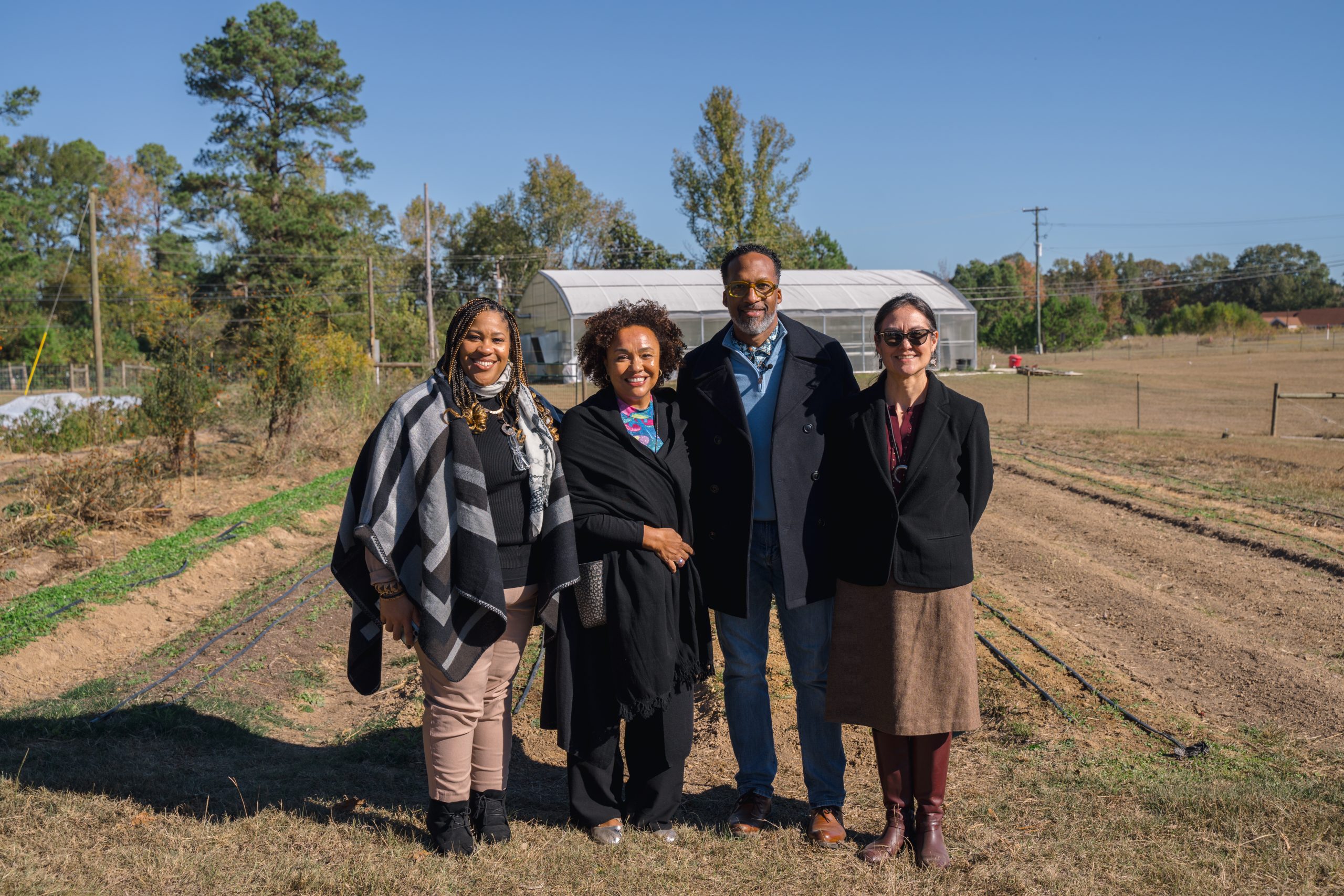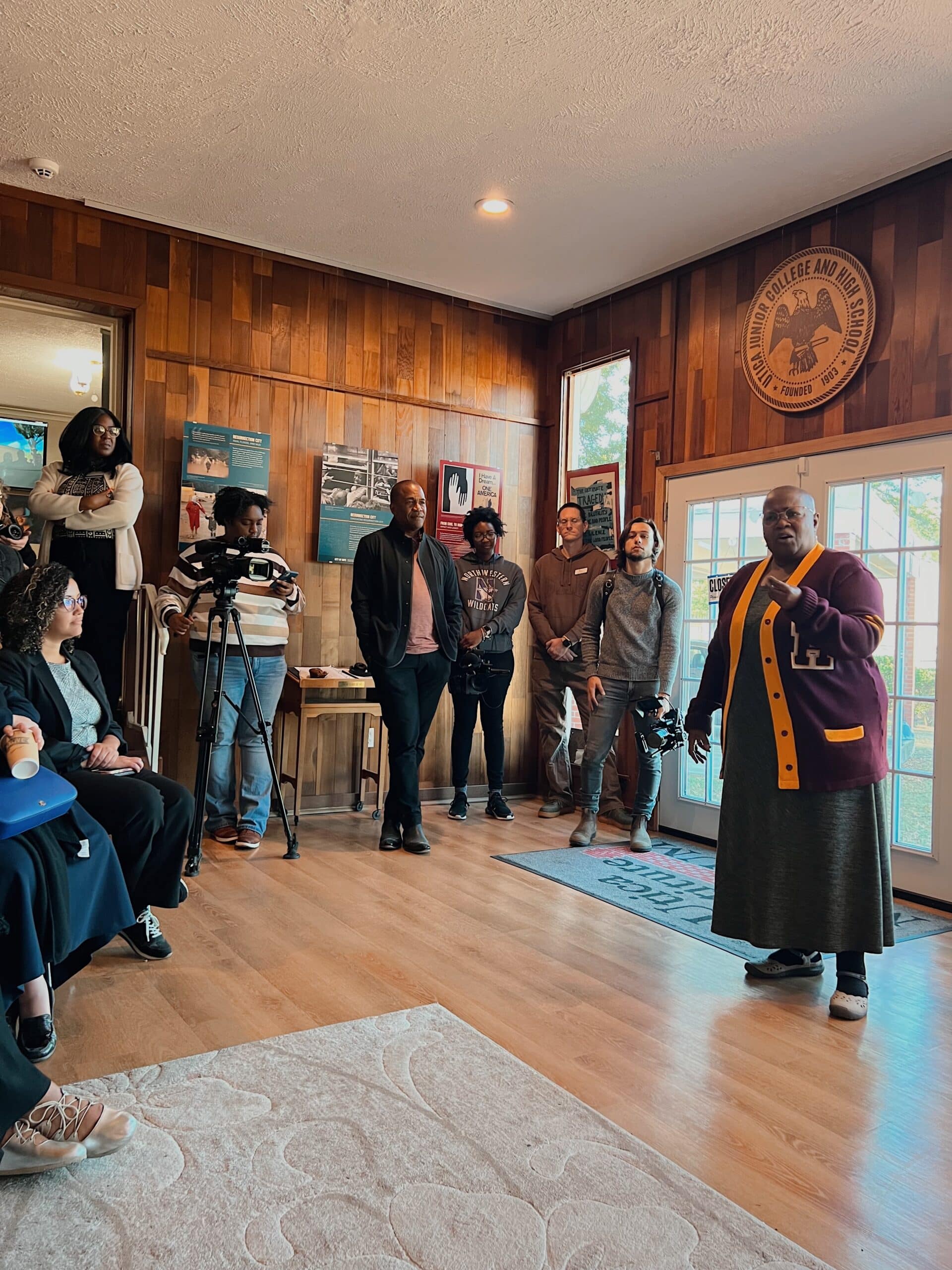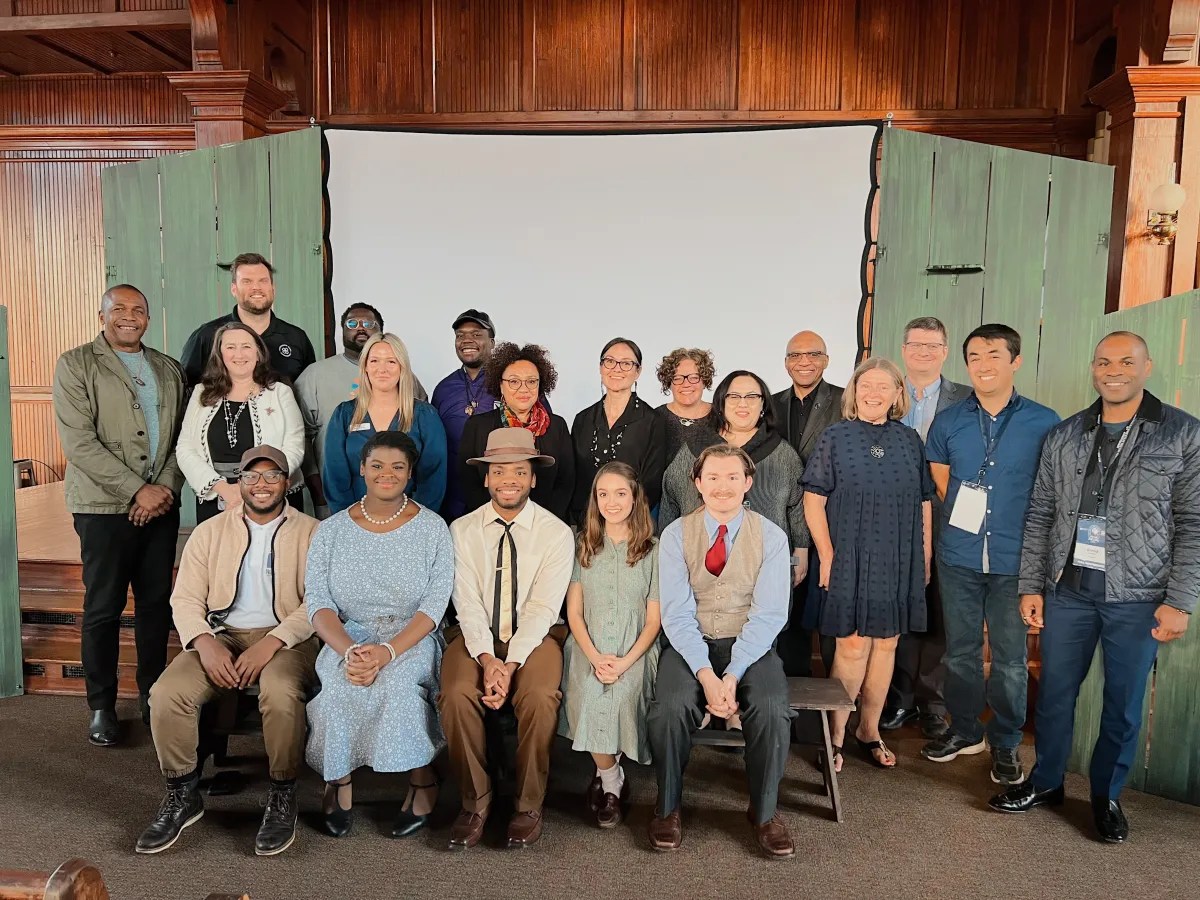Mississippi Today
Arts and humanities leaders visit Mississippi, come away with stories, ideas, affirmations

In a memory quilt by Hystercine Rankin at the Mississippi Museum of Art, National Endowment for the Arts Chair Maria Rosario Jackson found a touchstone for a phrase that echoed throughout her recent Jackson visit: “the opportunity to live an artful life.”
“It’s always available to us,” Jackson said, and not limited to designated places but alive in opportunities to make, teach and learn, and even in traditions handed down in families. “That quilting tradition, and how it shows up — from a living culture to something that is hung with so much pride on the walls of an esteemed cultural institution — there’s something in that, that demonstrates the breadth of what can encompass an artful life.
“If we have artful lives, and we’re able to see each other’s humanity, it’s such a pre-condition for all of the other things we say we want to do as a nation of opportunity and justice,” Jackson said.
Read: Ravi Lovett, healing quilter and art therapist
National Endowment for the Humanities Chair Shelly Lowe, a citizen of the Navajo Nation, found a welcome grounding at the Choctaw Chahta Immi Cultural Center in Philadelphia, the first site in her first visit to Mississippi. Conversations about the Choctaw dictionary project, and the importance of maintaining their language and cultural teachings, resonated. As did the commitment of smaller organizations she visited, such as the Smith Robertson Museum in Jackson, to confront and share histories that can sometimes be hard to face.
“This is what the humanities does,” Lowe said. “It helps us take this information, take difficult histories, and it allows us to pause and really think about those histories. To process that. The humanities, and I would argue the arts, give us the strength to move forward.”
Their recent visit, in company with leaders of other national and regional arts and culture groups, offered a firsthand look at work in Jackson and central Mississippi that fosters creative pursuits, cultural celebration, connection, conversations and community cohesion.
The 50th anniversary reconvening of the Phillis Wheatley Poetry Festival, Nov. 1-4, was the core attraction, with its roster of illustrious Black women writers, including Alice Walker and Sonia Sanchez, who were also part of the original conference Margaret Walker organized at Jackson State University in 1973.
The 2023 conference at JSU and the Jackson Convention Complex pulled in the next generation of prominent Black women writers, with Jesmyn Ward and Angie Thomas among a host of keynote participants. With intergenerational conversations a big draw, the festival tapped elder wisdom and contemporary voices and vigor, to inspire and energize listeners in the continued uplift of Black excellence, and as a force to reckon with injustice and trauma both past and now.
The convening amplified arts’ and humanities’ central role in daily life in Jackson and far beyond, said Phoebe Stein, president of the Federation of State Humanities Councils. “Not a luxury, but central to how we understand ourselves, and how we relate and live in community with others.”
Difficult histories — unpacked, discussed and shared to unite and strengthen — were as much a thread as celebration and support during leaders’ jam-packed itinerary. Both endowment chairs were part of the poetry festival’s closing panel, a tribute to Margaret Walker, and their twin presence in Jackson offered a prime chance for show-and-tell by Mississippi’s cultural leaders.
Mississippi Arts Commission’s David Lewis and Mississippi Humanities Council’s Stuart Rockoff built out “Chair-a-paloosa,” as they informally dubbed the gathering, with a robust schedule highlighting grantees in action.

In addition to the poetry festival, tours and stops took in Sipp Culture in Utica, the Utica Institute Museum, the Choctaw Chahta Immi Cultural Center in Philadelphia, and in Jackson, JSU, the Two Mississippi Museums, Smith Robertson Museum, Mississippi Museum of Art, Tougaloo College, the Asylum Hill Research Project and more. At Tougaloo’s historic Woodworth Chapel, they saw a preview of New Stage Theatre’s “Anne & Emmett’ Arts in Education production, a “meeting in memory” between Anne Frank and Emmett Till.
It’s rare to get that many national arts and humanities figures together, and rarer still to host them in such a small-town setting, noted Carlton Tucker, co-director of Sipp Culture, which harnesses food and story to reimagine their community and outfit it for the future. “For them to take an interest in a small, rural community and the work that we’re doing there, is remarkable, but it’s also remarkable for the state of Mississippi, because it just shows that there are a lot of things happening here that don’t necessarily show by the way that people think about the state from a national perspective.”
South Arts President and CEO Susie Surkamer praised the “incredible amount of really substantial work going on, and in all types of settings” in Mississippi, “and such high quality.” In much of it, the importance of involving the community also stood out. “That doesn’t always happen with every institution or organization, so that is wonderful to see.”
For the cadre of arts and humanities leaders, it was a chance to connect outside of a Zoom room or formal meetings, have cultural and historical experiences together “and really sit with the arc of American history and Mississippi’s place in that, and really consider the implications on our own work today,” said David Holland, co-chair of the Creative States Coalition and deputy director of WESTAF (Western States Arts Federation). “It really puts it into context … the significance of arts and culture to people’s lives, to healing, to understanding our history, to moving forward in a more just future together.”
“It is a treat for them and an opportunity for Mississippi to be a backdrop for larger conversations about our nation,” Lewis said. Plus, the showcase of daily arts-related work in both rural and metro settings in Mississippi can “really be a beacon … for the rest of the country.”
As well as the profile boost, it can bring benefits later on and inspire organizations to apply for funding, Rockoff said. “We hope, down the road, that it results in more grant funding coming to Mississippi.
“We’re a poor state. … In other states, there are plenty of other funders for these types of cultural activities. So, to have that support from the national endowments — that relatively small amount of money goes a long way here.”
There’s payoff, too, in the favorable impressions festival participants and visiting leaders pack up, take with them and spread back home.

On Lowe’s flight from Atlanta to Jackson last week, it was clear half the plane was bound for the Phillis Wheatley Poetry Festival, she said. “This festival brought in so many young African-American women — scholars, artists, poets, writers — who are all across the country, but they’re here in Mississippi,” sharing the impact of the people, the place and the program here.
“And, they’re all going to leave here, right? Talking about how they were here in Mississippi and how Mississippi is playing such a big part in their lives,” Lowe said. “Things like that are a very good way to say, ‘This is our history. This is the power of what we’ve done. This is where we’re going to continue to keep doing it.’”
This article first appeared on Mississippi Today and is republished here under a Creative Commons license.
Did you miss our previous article…
https://www.biloxinewsevents.com/?p=306413
Mississippi Today
MS House member agrees to pre-trial program after indictment
Rep. Keith Jackson, a Democratic lawmaker from Kemper County, can remain in office despite a felony indictment by participating in a pre-trial intervention program, according to court documents.
A grand jury last year indicted Jackson, a first-term House member, on charges of receiving stolen property – specifically, a 2006 Magnolia timber trailer worth about $15,000. The grand jury also indicted two other people, Fredwrick (sic) Young and William Tate, in connection with the criminal charges.
Jackson did not respond to a request for comment, and his attorney, Christopher Collins, declined to comment.
Cassie Colman, the district attorney in the 10th circuit district, told Mississippi Today that the state agreed to let Jackson participate in pretrial intervention because he had no prior criminal record. If Jackson completes the terms of the pre-trial agreement, then the criminal charges will be expunged from his record.
Going to trial would likely be risky for the lawmaker because, if convicted of the offense, he could lose the right to hold elected office.
Receiving stolen property is a disenfranchising crime in Mississippi, and if someone is convicted of a disenfranchising crime, they lose their right to vote. To run for office in Mississippi, someone must be a registered voter.
But Coleman, who prosecuted the case against Jackson, said the legislator’s agreement to enter the program is neither a guilty plea nor a conviction. Instead, he will enroll in the intervention program for at least a year and pay around $3,350 in fees, according to court documents.
If he fails to meet the terms of the agreement, the district attorney could remove him from the program and prosecute him for the original crime.
This article first appeared on Mississippi Today and is republished here under a Creative Commons Attribution-NoDerivatives 4.0 International License.
Note: The following A.I. based commentary is not part of the original article, reproduced above, but is offered in the hopes that it will promote greater media literacy and critical thinking, by making any potential bias more visible to the reader –Staff Editor.
Political Bias Rating: Centrist
The article presents factual information about a Mississippi House member’s legal situation, focusing on the details of the pre-trial intervention program and the potential consequences if he fails to meet the terms. There is no overt political commentary or slant, and it primarily reports on the legal process and actions taken by both the accused lawmaker and the prosecuting district attorney. The tone is neutral, and it avoids sensationalizing the case or making political judgments. Given the absence of opinion or partisanship, the content is categorized as centrist.
Mississippi Today
On this day in 1951, Ruby Hurley opened NAACP office in South
April 28, 1951

Ruby Hurley opened the first permanent office of the NAACP in the South.
Her introduction to civil rights activism began when she helped organize Marian Anderson’s 1939 concert at the Lincoln Memorial. Four years later, she became national youth secretary for the NAACP. In 1951, she opened the organization’s office in Birmingham to grow memberships in Alabama, Florida, Georgia, Mississippi and Tennessee.
When she arrived in Mississippi, there were only 800 NAACP members. After the governor made remarks she disagreed with, she wrote a letter to the editor that was published in a Mississippi newspaper. After that step in courage, membership grew to 4,000.
“They were surprised and glad to find someone to challenge the governor,” she told the Chicago Defender. “No Negro had ever challenged the governor before.”
She helped Medgar Evers investigate the 1955 murder of Emmett Till and other violence against Black Americans. Despite threats, she pushed on.
“When you’re in the middle of these situations, there’s no room for fear,” she said. “If you have fear in your heart or mind, you can’t do a good job.”
After an all-white jury acquitted Till’s killers, she appeared on the front cover of Jet magazine with the headline, “Most Militant Negro Woman in the South.”
Months later, she helped Autherine Lucy become the first Black student at the University of Alabama.
For her work, she received many threats, including a bombing attempt on her home. She opened an NAACP office in Atlanta, where she served as a mentor for civil rights leader Vernon Jordan, with whom she worked extensively and who went on to serve as an adviser to President Bill Clinton.
After learning of Evers’ assassination in 1963, she became overwhelmed with sorrow. “I cried for three hours,” she said. “I shall always remember that pool of blood in which he lay and that spattered blood over the car where he tried to drag himself into the house.”
She died two years after retiring from the NAACP in 1978, and the U.S. Post Office recognized her work in the Civil Rights Pioneers stamp series. In 2022, she was portrayed in the ABC miniseries, “Women of the Movement.”
This article first appeared on Mississippi Today and is republished here under a Creative Commons Attribution-NoDerivatives 4.0 International License.![]()
Note: The following A.I. based commentary is not part of the original article, reproduced above, but is offered in the hopes that it will promote greater media literacy and critical thinking, by making any potential bias more visible to the reader –Staff Editor.
Political Bias Rating: Centrist
This content is primarily focused on the historical and personal achievements of Ruby Hurley, a civil rights activist. It emphasizes her dedication and bravery in challenging oppressive systems and advocating for racial justice. The narrative does not appear to endorse or criticize any contemporary political positions but highlights Hurley’s work with the NAACP and her role in significant civil rights events. While it mentions her opposition to certain government figures and the threat she faced, the tone is largely factual and centered on her contributions to history, which supports a centrist position without leaning toward a particular ideological side.
Mississippi Today
Podcast: Mississippi citizens often left in the dark on special-interest lobbying of politicians
The post Podcast: Mississippi citizens often left in the dark on special-interest lobbying of politicians appeared first on mississippitoday.org
Note: The following A.I. based commentary is not part of the original article, reproduced above, but is offered in the hopes that it will promote greater media literacy and critical thinking, by making any potential bias more visible to the reader –Staff Editor.
Political Bias Rating: Center-Left
This content reflects a Center-Left bias primarily due to its focus on transparency issues regarding special-interest spending and lobbying in Mississippi. The mention of negative implications associated with lobbying efforts suggests an advocacy for accountability and reform, which aligns with a progressive stance often seen in Center-Left discourse. Additionally, the subject matter, involving regulation of online sports betting, typically garners support from more liberal perspectives concerned about consumer protection and ethical governance.
-

 SuperTalk FM6 days ago
SuperTalk FM6 days agoNew Amazon dock operations facility to bring 1,000 jobs to Marshall County
-

 News from the South - Missouri News Feed2 days ago
News from the South - Missouri News Feed2 days agoMissouri lawmakers on the cusp of legalizing housing discrimination
-

 News from the South - Alabama News Feed7 days ago
News from the South - Alabama News Feed7 days agoPrayer Vigil Held for Ronald Dumas Jr., Family Continues to Pray for His Return | April 21, 2025 | N
-

 News from the South - Florida News Feed6 days ago
News from the South - Florida News Feed6 days agoTrump touts manufacturing while undercutting state efforts to help factories
-

 News from the South - Florida News Feed6 days ago
News from the South - Florida News Feed6 days agoFederal report due on Lumbee Tribe of North Carolina’s path to recognition as a tribal nation
-

 Mississippi Today4 days ago
Mississippi Today4 days agoStruggling water, sewer systems impose ‘astronomic’ rate hikes
-

 News from the South - Oklahoma News Feed6 days ago
News from the South - Oklahoma News Feed6 days agoOklahoma Treasurer’s Office Faces Scrutiny Over Use of Signal in Anti-ESG Coordination
-

 Mississippi Today1 day ago
Mississippi Today1 day agoDerrick Simmons: Monday’s Confederate Memorial Day recognition is awful for Mississippians














































